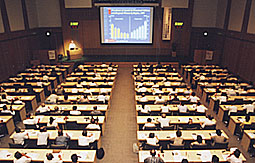 Abstract of the International Symposium (August 5, 2005)
Abstract of the International Symposium (August 5, 2005)

- Program
-
- Date
- August 5, 2005
- Location:
- Awaji Yumebutai International Conference Center, Hyogo(1 Yumebutai, Awaji-shi, Hyogo)
- Details
- (1)Commemorative Lecture(13:30-14:45)
-
- [ Future Challenges for Asian Food and Agricultural Policy ]
Senior Fellow, East-West Center / Professor of Economics, University of Hawaii - Per Pinstrup-Andersen
- H.E.Babcock Professor of Food, Nutrition and Public Policy, DNS, Cornell University
- [ Future Challenges for Asian Food and Agricultural Policy ]
- (2)Discussion
- (15:00~16:30)
-
- Panelists
- Taku Kajiwara
- Former President of the National Governors’ Association / Former Governor of Gifu Prefecture
- Sakutaro Tanino
- Director, Toshiba Corporation
- Yukiko Fukagawa
- Professor, Graduate School of Arts and Sciences ,University of Tokyo
- Mahabub Hossain
- Head,Social Sciences Division International Rice Research Institute(IRRI)
- Toshio Yamada
- Senior Executive Director, JA Zenchu( Central Union of Agricultural Co-operative)
- Yutaka Katayama(coordinator)
- Dean, Graduate School of International Cooperation Studies, Kobe University
- 〔Japanese syllabary order〕
The symposium began with an opening address by Mr. Satoshi Iue, the Representative Director of the Asia Pacific Forum Awaji Conference Japan, and a welcoming address by Mr. Tomio Saito, the Vice Governor of Hyogo Prefecture, who attended the symposium on behalf of Mr. Toshizo Ido, the Governor of Hyogo Prefecture. Following these two addresses, Mr. Per Pinstrup-Andersen, the H. E. Babcock Professor of Food, Nutrition and Public Policy of the Division of Nutritional Sciences at Cornell University, gave a commemorative speech under the theme of "Future Challenges for Asian Food and Agricultural Policy."
In the commemorative speech, Professor Anderson noted on the issues faced by Asia and the world, namely in the areas of food, agriculture and nutrition, as well as policies that must be implemented to resolve these issues.
In the panel discussion that followed, Mr. Yutaka Katayama, the Dean of the Graduate School of International Cooperation Studies of Kobe University, led a heated debate which looked into various aspects under the theme of "Food Crisis in a Rapidly Growing Asia."
Mr. Taku Kajiwara pointed out the importance of preparing for the future food shortages from the standpoint of local governments while giving a real life example in Gifu Prefecture and remarked, "As the food problems contain a lot of risk factors including population increase, water resource shortage, desertification of national land, and abnormal weather, among others, food shortages or food panic are thought inevitable to occur. Therefore, it is the priority issue of the political administration to be able to respond to these events."
Mr. Sakutaro Tanino stated his view on the measures to resolve the issues of food and agriculture from a global perspective by stating that, "In order to resolve the issues of food and agriculture, the experiences of economic development in the East Asian countries including that of China shall be more broadly shared with Africa. I believe that the Japan-China cooperation may be further developed to promote agriculture in Africa."
Ms. Yukiko Fukagawa commented on the food security of Japan through utilization of the FTA as well as its contribution to the Asian community by stating that, "Negotiations for an FTA between two countries allow to further liberalize agricultural trade in a mutually beneficial manner as the two countries also negotiate for details such as protection of intellectual property rights, distribution of agricultural products, conservation of resources and environment with the neighboring countries and more. At the same time, if an agricultural reform is realized in Japan, then these know how may be applied and used in other Asian countries."
Mr. Mahabub Hossain pointed to the issues experienced in South Asia and the possibility of this region facing food shortages that, "In Asia, and particularly in the South Asian region, the absolute number of the population will continue to rise, and food shortages may be triggered by such issues as water shortages and climate change as well as the issue of people moving away from agriculture due to income disparity from the urban areas. Furthermore, South Asia will face difficulty should the food price in the global market skyrocket in response to the increase in demand for food by China."
Mr. Toshio Yamada presented his opinion on the development of domestic agricultural businesses from the standpoint of a Japanese agricultural producer that, "Japan has proposed and engaged in efforts to formulate the "Plan for farmland utilization and development of farming villages," mainly in the villages while taking into account the characteristics of Japanese rice paddy farming. It is vital for the Japanese agricultural policy to implement measures that will protect the beautiful scenic view of the farming villages as well as the environment, and to foster various types of successors based on the circumstances and situations of each region. I believe this to be a common issue for all Asian countries where its agriculture is characterized by its rice paddy farming."
The venue was filled with approximately 250 attendees from seven countries including the Ambassador of Fiji to Japan.






